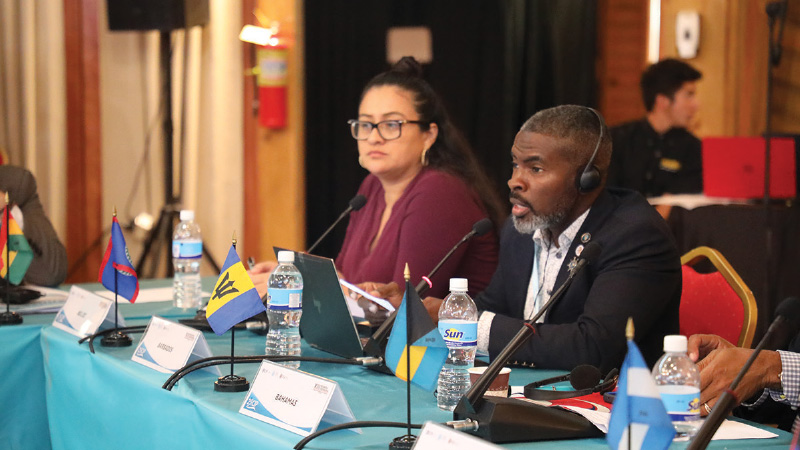By Mona Swoboda
As the port and maritime sector recovered from COVID-19’s shipping disruptions, the UNCTAD Review of Maritime Transport 20231 predicted a positive trend in global maritime trade volumes for 2024. In addition, shipping connectivity2 was at record highs for Latin America and the Caribbean. Despite this promising forecast, the maritime and port sector in Small Island Developing States (SIDS) faces challenges that will determine its performance in 2024.
Green port operations and digitalisation processes, including the Maritime Single Window (given the International Maritime Organization’s FAL convention mandatory by January 1, 20243), are at the forefront of several issues Caribbean ports will continue to tackle in the period ahead. In this context, the Secretariat of the Inter-American Committee on Ports (CIP) of the Organization of American States (OAS) has formulated several organizational priorities to better assist member states’ national port authorities in their port modernization efforts.
“As we prepare for 2024, the CIP Secretariat will endeavour to strengthen existing synergies as we create new ones within and beyond the CIP membership,” said Jorge Durán, Chief of the CIP Secretariat. “These synergies can be attained by joining efforts with Member States, Associate Members and Strategic Partners from the 100+ member strong network and they are critical to provide concrete benefits to our stakeholders.”
In addition to its 35 Member States, represented by the national port authorities of all sovereign nations in the Western Hemisphere, the CIP community includes Associate Members and Strategic Partners, from public and private entities, academia, non-profits, development banks and other regional port associations.
As mandated, the CIP Secretariat pays attention to institutional capacity building and human resource training. With the Caribbean’s port sector continuing modernisation, it is critical that ports align port modernisation plans with appropriate training. For 2024, the CIP Secretariat will continue its training offer in both English and Spanish. Indeed, it may be possible to increase the training opportunities offered.
“This includes certified online and in-situ courses, technical webinars, as well as hemispheric conferences focusing on the sector’s most pressing issues,” Durán said.
He indicated that in 2024, a number of hemispheric conferences and seminars will be organized with support from national port authorities, including:
• VI Hemispheric Conference on Logistics, Innovation and Competitiveness, January 17-19, in Veracruz, Mexico,
• V Hemispheric Conference on Port Security and Resilience, with financial support from the United States Department of State, New Orleans, United States, late-April; and, the
• V Hemispheric Seminar on Port Legislation, Public Policy, and Regulation, in Guatemala City, Guatemala, May 2-3.”
Technical assistance
In addition to strengthening institutional capacities of national port authorities through training and capacity-building initiatives, the CIP Secretariat assists OAS Member States through targeted technical assistance projects, financed by development partners, such as the Caribbean Development Bank (CDB).
“The project ‘Feasibility study for the establishment of an electronic single window for foreign trade in Belize’ was scheduled to be finalized by the end of 2023, however, the CIP Secretariat will continue to serve as an advisory body for the Government of Belize throughout 2024, in the context of the study,” Durán said.
Other CIP technical assistance projects to be successfully concluded in 2023 include the CDB-funded “Feasibility study for the establishment of a Barbados Port Community System”, as well as the project “Improved Disaster Risk Management for Caribbean Ports”, financed by the Governments of Italy and the United States.
Durán also indicated that in 2024, there will be some additional technical expertise added to the CIP Secretariat.
“Thanks to the support from the Mexican Secretariat of the Navy (SEMAR), who has seconded a Commander to the Secretariat. We will certainly strengthen our capacities and technical offerings in the area of port security and protection. Our organizational priorities always include creating more efficiency and economies of scale at the Secretariat,” he said.
*Mona Swoboda is Programme Manager at the CIP Secretariat, www.portalcip.org.
1 UNCTAD Review of Maritime Transport 2023
2 Shipping connectivity
3 https://www.imo.org/en/MediaCentre/PressBriefings/pages/Mandatory-Maritime-Single-Window-One-year-to-go-.aspx1

